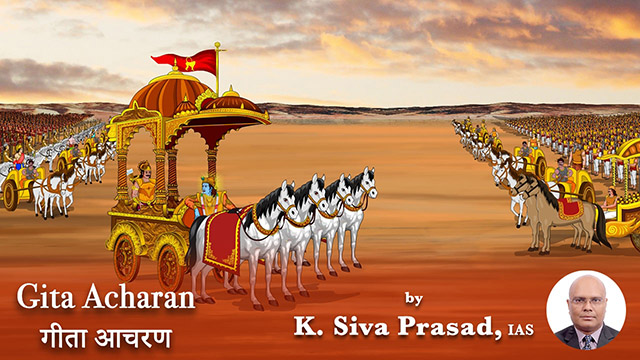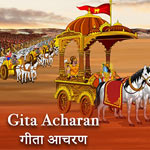
Curiosity is essential for survival. In today's context, one is expected to be updated in one's professional as well as personal life. Arjun raises the question of what is to be known (13.1). About this, Krishna earlier mentioned that 'once that is known there is nothing left to be known' (7.2).
Krishna says, "I will declare 'That' which is to be known, which having known one enjoys immortality; beginningless is the Supreme Spirit who is spoken of as neither existent (𝙨𝙖𝙩) nor nonexistent (𝙖𝙨𝙖𝙩) (13.13). With hands and feet everywhere, with eyes, heads, ears and mouths everywhere, He dwells in the world enveloping all (13.14). Shining in all the sense faculties, yet transcending the senses; unattached to creation, yet supporting all; free from the 𝒈𝙪𝒏𝙖𝒔 (qualities of nature), yet the Enjoyer of them" (13.15).
The fear of death is the foundation of our fears. The loss (death) could be of life, reputation or possessions. Krishna assures that one enjoys immortality as one is freed from all fears once 'That' is known.
Earlier, Krishna described 𝙎𝙖𝙩 as eternal and 𝘼𝙨𝙖𝙩 as the one which wasn't there in the past and which wouldn't be there in the future (2.16); and learn to differentiate between them. Rope-snake analogy is often quoted to understand this intricacy. Now Krishna says He is both. It's about developing the ability to separate both and subsequently realising that He is both. Similarly, he is both 𝙎𝙖𝙜𝙪𝙣 (form) and 𝙉𝙞𝙧𝙜𝙪𝙣 (formless). With eyes and ears everywhere, he perceives everything; with hands everywhere, His helping hands are available to everyone who approaches Him with 𝙎𝙝𝙧𝙖𝙙𝙙𝙝𝙖 (trust) and 𝘽𝙝𝙖𝙠𝙩𝙞 (devotion).
Our mind is trained to divide whereas 'ought to be known' is an assimilation of apparent contradictions. It's like a mixture of all colours into white and the wave particle duality of light.

